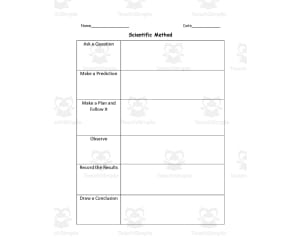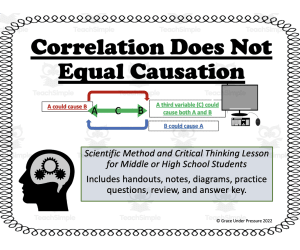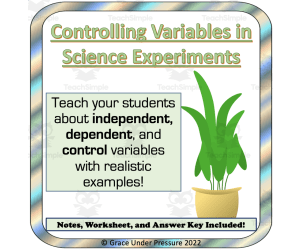2,798 products added recently
Scientific Method Experiments
Teach students the fundamental process of scientific inquiry with experiments that emphasize the scientific method. This collection includes activities that guide students through forming hypotheses, conducting experiments, and analyzing results. By incorporating these experiments into your curriculum, you can develop critical thinking and analytical skills.
Scientific Method Hypothesis Activity
Science, Basic Science, Grade 3, 4, 5, 6, 7, 8, 9, Activities, Experiments
Activity Introduction An amazing activity designed for the students to learn more about STEM subjects. Scientific Method Hypothesis Do you like STEM subjects? what is your favorite one? Have you ever tried to plant a seed? If yes, tell us more about it. Or have you ever tried to invent something? If yes, tell us more about it. And how do you think it will help us? Have you ever seen a microorganism under a microscope? What was it? And how it looked like? Mathematics is a marvelous subject. Let' sharpen our brains and solve some equations. Do you like timetable tricks? What is your favorite one? Do you know how to code? Have you ever created an app or a game before? If yes, how was it like? Scientific Method Hypothesis Activity The activity is perfect for encouraging the researching skills for the students, while learning more about this topic. Scientific Method Hypothesis This friendly designed worksheet is suitable for students at school, homeschooling, and as a group activity. Instructions Your are doing a scientific research/ experiment . Tell us what was your: Observation Main question Hypothesis and tell us more about the research/ experiment . Format Available in a PDF format.
Author Educational Voice
Tags Scientific Method Hypothesis Activity, Scientific Method Hypothesis, Scientific Method, Scientific Methods For Kids, Hypothesis, Hypothesis Facts, Hypothesis For Kids, STEM, STEM Facts For Kids
Scientific Method Templates - Perfect for Basic Science Experiments
Research, Science, Basic Science, Elementary, Homeschool Resources, Not Grade Specific, Pre-K, Experiments, Activities, Labs
This super basic Scientific Method Template is perfect for getting kids started with the scientific method and for teaching them about scientific research. There are two versions of the template, one with cute pictures and one without pictures. This template can and has been used for all ages up to high school and even adults for basic in-home and at school experiments. Not only could you use this template in the kitchen for food science and baking experiments, for example, comparing the different weights between baking flours, but you can use it for basic chemistry, physics, life science, and more. Kids can use it to jot their ideas down if they aren't sure what they want to do for their experiment or science research project. It is super easy to use and self-explanatory and would be a perfect brainstorming tool. pdf downloadable file, 2 usable pages with cover sheet. Minimal ink needed. Not age specific but may be especially useful for younger elementary and special education students. Also, for visual learners and kids who aren't reading yet (the template with the pictures tells the story without needing to read).
Author Homeschooling Dietitian Mom
Tags 1st Grade Science Experiments, 2nd Grade Science Experiments, 3rd Grade Science Experiments, Scientific Research Projects, Science Templates, Science Worksheets, Science Writing Prompts
Scientific Method - Lab Station Activity
Science, Basic Science, Grade 6, 7, 8, 9, Labs, Experiments, Activities
Scientific Method - Lab Station Activity This lab station activity allows students to apply their understanding of the scientific method by moving around the classroom and working with peers. Stations focus on creating hypotheses and procedures, identifying variables, analyzing data and drawing conclusions, and formulating testable questions. The varied format facilitates unique learning and assessment opportunities. Typically 2-3 stations are graded per group in a 30-minute timeframe. Stations work well for introducing or reviewing the scientific method in middle and high school science classrooms. This general science resource can be adapted for use in chemistry, physics, biology, and other branches when customized hypotheses and testable questions are generated.
Author Teach With Fergy
Tags Lab Safety, Science Safety, Classroom Lab Safety, Lab Safety Lab Station, Lab Station Activity
Correlation Does Not Equal Causation: Scientific Method and Critical Thinking Lesson for Middle Grades or High School
Social Studies, History, Psychology, Science, Basic Science, Grade 6, 7, 8, 9, 10, 11, 12, Activities, Experiments, Worksheets & Printables, Worksheets
Scientific Method and Critical Thinking Lesson for Middle or High School Students This lesson walks students through correlation and true experiments in an easy-to-understand and engaging manner. 12 different correlation examples are included. The package includes handouts, notes, diagrams , practice questions, a review, and answer key. How to Use: Print a 7 page package for each of your students. Present pages 1-4 on an interactive whiteboard and teach your students the basics of correlation (scatterplots, positive correlation, negative correlation, correlation coefficients, mistaking correlation as causation, media examples, reverse causation, third variables, etc.) as they fill in questions and notes. Then, students can do the practice questions on their own or in small groups (answer key included). Next, present page 6 to explain how to actually find causation in a true experiment : random selection, random assignment, dependent variable, independent variable, experimental group, control group, etc. Finally, students complete a one-page review (answer key included) Grades to Use With: This lesson was designed to be accessible to students as young as grade six all the way through high school. It could be an addition to a science unit about experimental methods, a science fair unit, a grade 8 math unit about scatter plots, or even a psychology class. Standards: CCSS8.SP.A.1 Construct and interpret scatter plots for bivariate measurement data to investigate patterns of association between two quantities. Describe patterns such as clustering, outliers, positive or negative association, linear association, and nonlinear association. CCSS8.SP.A.2 Know that straight lines are widely used to model relationships between two quantitative variables. For scatter plots that suggest a linear association, informally fit a straight line, and informally assess the model fit by judging the closeness of the data points to the line.
Author Grace Under Pressure
Tags Correlation, Causation, Critical Thinking, Scientific Method, Experiments, Reasoning, Experiment, Science Fair, Basic Science, Research, Mistaking Correlation For Causation
Science Experiment: Independent, Dependent, and Controlled Variables
Science, Basic Science, Grade 4, 5, 6, 7, 8, Activities, Experiments
This fun science lesson is a great introduction for a science fair unit or a beginning of the year scientific method unit when you need to teach your students how to carry out a true experiment . It teaches students about independent, dependent and controlled variables using humour and real-life situations. The first page has fill-in-the blank notes about a pretend experiment I completed that had some mistakes in the design. Students should stay engaged and focused throughout the lesson component as they have to fill in the blanks. They should start to think about why controlling variables matters, and they learn the relevant vocabulary. The second page gives students a chance to start brainstorming some basic experimental design ideas on their own or in pairs. They are given three situations and need to think of independent variables they could alter, what dependent variable that would affect, and all of the other variables they would need to carefully control. At the end, there is a quick review to reinforce the relevant vocabulary. Grades to Use With: This lesson can easily work in a variety of grades in the middle years, from grades 4-8 and possibly beyond! Standards: NGSS3-5-ETS1-3 Plan and carry out fair tests in which variables are controlled and failure points are considered to identify aspects of a model or prototype that can be improved. If you enjoy this science activity, check out some other options in my store: Personal Carbon Emissions /Footprint: Integrated Math and Earth Sciences Lesson: Ways to Slow Climate Change Periodic Table: Element Baseball Cards STEM Project: Extreme Environment Technology Design and "Shark Tank" Presentation STEM Project: Climate Change Solutions 8 Low-Prep STEM Tasks for Elementary and Middle School Students: Simple Handouts for Each Experiment
Author Grace Under Pressure
Tags Science Experiments, Independent Variable, Dependent Variable, Science Fair, Scientific Method, Control Variable, Experiment, STEM, Science, Elementary Science, In A Controlled Scientific Experiment, Independent Dependent And Controlled Variables, Variables In Science Experiments, Independent, Dependent And Controlled Variables, Scientific Experiment Variables, What Is A Controlled Scientific Experiment, Controlled Variable Scientific Method, Independent And Controlled Variables, Controlled Scientific Experiment, What Are Controlled Variables In A Science Experiment, Science Fair Project Ideas With Independent And Dependent Variables, Science Fair Variables, What Is An Independent Dependent And Controlled Variable, Science Experiments With Independent And Dependent Variables, Independent Controlled And Dependent Variables, What Is The Control Of A Science Experiment, Examples Of Independent Dependent And Controlled Variables, Controls In Science Experiment, What Is A Controlled Scientific Study Of Specific Variables, Controlled Variable Science, What Are Variables In A Science Project, Variables In A Science Project, Controlling Variables In Science, What Is A Controlled Variable In A Science Experiment, Controlled Variables Science, Control Science Experiments, Independent And Dependent Variables Worksheet Middle School Science, Dependent Independent And Controlled Variables, Science Experiments With Variables, What Is The Difference Between Independent And Dependent And Controlled Variables, Science Variables Coloring Page, 3 Controlled Variables, In A Controlled Scientific Experiment,, Variables Of A Science Project, Control Dependent And Independent Variables, Control Variables In Science, Controlled Variables In Science, Control Variables Science, Variables Science Experiments, Independent Variable Clipart, Independent Dependent And Control Variables, What Are Independent Dependent And Controlled Variables, Variables In A Science Experiment, Science Experiment Control, Variables For Science Projects






